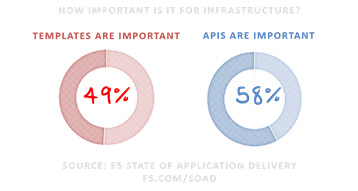OpenStack is making its way into production. In OpenStack’s sixth user survey, it found that 60% of deployments were there, in production. That’s compared to only 32% a mere two years earlier. That’s in part thanks to the steady growth of private cloud in the enterprise and agility in service provider environments.
As with nearly all emerging technologies and trends these days, the reasons were focused on speed. Not of packets on the wire, but on processes. Users were deploying OpenStack to accelerate innovation and deploy apps faster. Faster time to market is something we hear a lot associated with everything from cloud to DevOps to SDN to containers. It’s a reflection of the reality that processes and people aren’t scaling along with the business, at least not when both are stuck in manual land.
OpenStack continues to gain momentum as the basis for both private cloud in the enterprise and a network functions virtualization (NFV) enabler in service provider environments, both of whom are grappling with the challenge of scaling faster and further than ever before.
F5, no stranger to scalability, is dedicated to enabling not only enterprises and service providers reach their goals of faster deployments with greater business agility but the community that has long supported and driven OpenStack to become the force it is today: its developers. It’s not enough to just toss out plug-ins. It’s critical to be active in the entire process. That means enabling customers to rapidly deploy the app services they need in production environments through OpenStack as well as providing developers the means to easily access and adapt F5 services.
That’s why we’re excited to announce a number of initiatives supporting OpenStack in a number of ways.
First, we’ve released our LBaaS v1 plugin to GitHub (https://github.com/f5networks) so developers can easily adapt it to suit their needs, especially when it comes to integration with other tools and systems.
Second, we’re committed to supporting OpenStack Heat templates, and have released the first of our templates on GitHub, with plans for more. Here at F5 we’re absolutely committed to templates and their critical role in enabling organizations to deploy a broader and more robust set of app services beyond plain old load balancing through OpenStack, including advanced and app-centric load balancing. Those app services are critical to the successful delivery of the apps business relies on to become and remain competitive and to improve productivity.

And we’re not the only ones who think that. In our latest State of Application Delivery survey over half of respondents (58%) viewed API-enabled infrastructure as important, and nearly half (49%) said the same of templates. A plurality (60%) use ten of the twenty-four app (L4-7) services including load balancing, identity federation, DDoS protection, and performance-enhancing services. The ability to deploy those services through OpenStack instead of as disjointed manual processes is important to ensuring users are realizing the benefits they’re looking to experience by adopting OpenStack.
In fact, we’re making our Heat plugins and templates open source to support these efforts within OpenStack and our plugin is also pip (python package management system) installable, as an added bonus. That’s because both are important not just to us but to deployment efforts in general, and we want to make sure organizations can succeed in those efforts. We’ll continue actively contributing both in the community and at home, where we’re feverishly working on the next version of our LBaaS plugin.
And finally, we’re working with partners and the community at large to ensure what we’re doing works with what they (and you) are doing. To that end, we’re pleased to note that in addition to our RedHat OSPv6 certification and HPE Helion Ready certification we’ve also completed certification with the Mirantis OpenStack platform.
We’ve got more OpenStack goodness coming, so stay tuned!
About the Author

Related Blog Posts

Why sub-optimal application delivery architecture costs more than you think
Discover the hidden performance, security, and operational costs of sub‑optimal application delivery—and how modern architectures address them.

Keyfactor + F5: Integrating digital trust in the F5 platform
By integrating digital trust solutions into F5 ADSP, Keyfactor and F5 redefine how organizations protect and deliver digital services at enterprise scale.

Architecting for AI: Secure, scalable, multicloud
Operationalize AI-era multicloud with F5 and Equinix. Explore scalable solutions for secure data flows, uniform policies, and governance across dynamic cloud environments.

Nutanix and F5 expand successful partnership to Kubernetes
Nutanix and F5 have a shared vision of simplifying IT management. The two are joining forces for a Kubernetes service that is backed by F5 NGINX Plus.

AppViewX + F5: Automating and orchestrating app delivery
As an F5 ADSP Select partner, AppViewX works with F5 to deliver a centralized orchestration solution to manage app services across distributed environments.
F5 NGINX Gateway Fabric is a certified solution for Red Hat OpenShift
F5 collaborates with Red Hat to deliver a solution that combines the high-performance app delivery of F5 NGINX with Red Hat OpenShift’s enterprise Kubernetes capabilities.
